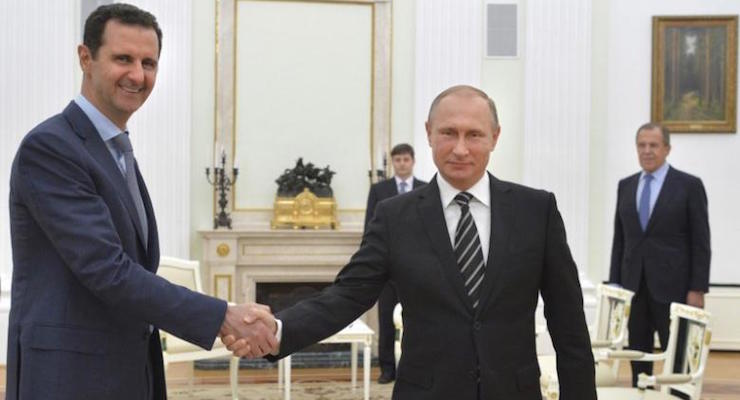

FILE – In this Oct. 20, 2015 file photo, Russian President Vladimir Putin, center, shakes hand with Syrian President Bashar Assad as Russian Foreign Minister Sergey Lavrov, right, looks on, at the Kremlin, in Moscow, Russia. For five years fighting has raged in Syria — a globally resonant nightmare kept going in part by the insistence of Bashar Assad’s opponents that he must go even though they were failing to dislodge him from power. Now an inflection point may finally be at hand, with increasingly important Turkey suggesting Assad could play a role in an unspecified transition period. (Photo: Kremlin Pool Photo via AP, File)
Several years ago, an airliner crashed in Russia because of pilot error, killing scores of people on board. At the crash site, a Western aid worker asked one of the government officials at the scene how something like this could happen. The response: “This is Russia.”
Human life in Russia is an uncertain proposition, which everyone knows could end early and unexpectedly. There is a pervasive fatalism, a belief that the end is coming and it won’t be good, so enjoy things while you can. This has permeated Russian culture for centuries. From Ivan the Terrible killing his own son to the executions of the Romanovs and the aristocracy by the Bolsheviks, Russians have believed a single human life is worth much less than the success of the state.
A friend in Moscow recently told me that Russians look down on the commercial movies of the West where the superhero saves the day. I asked what is a good Russian movie. “In the end, the worst thing happens and everybody dies. This is life,” I was told.
You could see this fatalism even on a trip to Moscow or St. Petersburg in the go-go 2000s. Russians were spending their newfound oil wealth as fast as they could: traveling, eating expensive meals and buying luxury cars. It was as if they knew the good times would not last and they had to spend their rubles before they were taken away.
During “The Great Patriotic War,” as the Russians call it, if the Nazi lines stood firm and Russian troops retreated, they frequently would be shot as they returned to friendly lines. This tended to sharpen the courage to take on the enemy, no matter the odds. Russian artillery units bombed their own villages as the enemy advanced so the Nazis would not enjoy the spoils of their victory. Stalin famously starved 20 million Ukrainians, who sat in the breadbasket of Europe, so he could feed the Soviet workers in the cities.
Flash forward to 2016, and ask Muscovites how they feel about Russian soldiers dying in Syria. The typical response goes something like this: “They took the job to earn more money than we can here in Moscow, so they can die. I have no sympathy for them.”
Human life is not sacrosanct in Russia. The culture does not wail and gnash its teeth over civilian deaths, if those deaths advance the needs of Mother Russia.
Russia has adopted the same attitude in Syria. Civilian deaths do not matter and may in fact aid the cause by hastening the ultimate Russian and Syrian victory. Western elites have forgotten what victory means. Secretary of State John Kerry famously chastised Russian President Vladimir Putin when he annexed Crimea by saying modern nations shouldn’t act as if it were the 19th century. Mr. Kerry was also famously wrong.
Russians don’t value some nebulous, high-minded globalist agenda. They value victory, whatever the cost. Civilian deaths do not matter, especially if they are on the adversary’s side. No amount of hand-wringing and preaching from the White House press room will change that.
I’ve often wondered where this attitude comes from and how it was integrated so thoroughly into Russian culture. I think a lot has to do with centuries of living under the control of the Mongolian hordes from the East, always paying tribute to the local warlord. It comes from centuries of conquest and survival, an attitude you can still see in eastern Ukraine.
Russia never experienced the Enlightenment. The society developed away from the intellectual currents that came to dominate the capitals of Europe, followed its own track, and was sheltered from the ideas and values that helped create the European Union.
But as the EU implodes in a spasm of nationalist fury, it raises the question of who actually has the more successful model for the long-term survival of a nation.
In any event, don’t look for the Russians to hold back in Syria. They will bomb hospitals, schools and civilian enclaves if they need to. Combined with President Obama’s incompetent machinations in the Middle East, that approach has proved to be the road to victory in Aleppo and elsewhere in the region.
Copyright © 2016 The Washington Times, LLC. Click here for reprint permission.
[mybooktable book=”motherland” display=”summary” buybutton_shadowbox=”true”]






Deplorable Taint / December 16, 2016
@LToddWood Can you blame them?
/